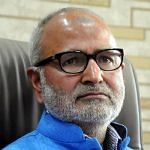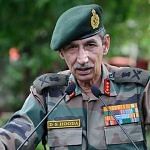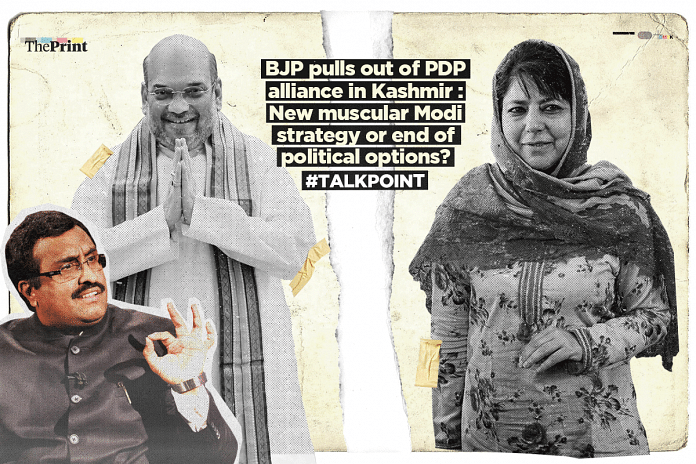The BJP, on Tuesday, walked out of the alliance with PDP in Jammu and Kashmir. The decision was taken during the BJP president Amit Shah’s meeting with J&K ministers and top leaders in New Delhi. According to reports, BJP was especially unhappy with Chief Minister Mehbooba Mufti’s handling of rising violence in the valley.
Shortly after, Mufti also submitted her resignation to Governor N. N. Vohra.
ThePrint asks – BJP pulls out of PDP alliance in Kashmir: New muscular Modi strategy or end of political options?
We had forged an alliance with BJP to unite Kashmir emotionally with the rest of India
 Naeem Akhtar
Naeem Akhtar
Senior leader, PDP
We went into this alliance against all odds. It was unpopular from day one.
We went in with a purpose and a larger objective – the interest of uniting Kashmir with the rest of the country emotionally. We thought that BJP was the dominant political power, with a strong leader and a strong party.
It wasn’t your usual power sharing arrangement. We had a hard task ahead of us, and we tried to do our best.
We do have the satisfaction of coming out of this with the feeling that we have managed to protect interest of the state. By and large, we have managed to establish that Kashmir issue can be resolved only through dialogue.
Although BJP’s future plan is not clear yet, we hope that it will not take a more muscular stance towards the Valley. It will be a tragedy. There have been many crackdowns in Kashmir in the past, even constitutional erosions, but they have only served to exacerbate the situation.
One can’t blame the deteriorating situation solely on the alliance. Despite opposition, we went in with the hope of not alienating the people of Kashmir further. We hoped to bridge the gap between Kashmir and Jammu. That is something we have managed to do to a certain extent. Jammu, which many thought, could flare up anytime because of communal fault lines, now enjoys a relative degree of peace.
I believe the alliance did provide a degree of stability. We will continue to work for the people of Kashmir irrespective of whether we are with BJP or in government, or not.
We want to bring lasting solution to Kashmir, not just appeasement
 Brig. Anil Gupta
Brig. Anil Gupta
Spokesperson, BJP
We need to control terrorism in Kashmir and restore the law and order situation in the state. Once that has been established, everything else will follow.
There are many problems, like unemployment, that the people of Kashmir face, but we cannot address them unless there is peace.
Clearly, this government failed in bringing the law and order situation under control. We had hoped that the ceasefire would provide it the ideal opportunity to make things better. However, we saw zero results. Although the PDP promised, it failed to bring other stakeholders to the negotiating table.
In every coalition government, there is always one decision-making party. The portfolio of law and order was with the PDP. But since the PDP sympathises with radical outfits like the Jamaat-e-Islami and Jamait Ahlee Adees, they took a very different approach towards militancy than the one we wanted. On several occasions, we completely disagreed with their decisions.
We tried our best. We even launched all-out operations. Reluctance on the part of the PDP and their vote-bank politics got in the way.
Our vision for the future is very clear. We are interested in bringing a permanent and lasting solution to the state, not just appeasement.
Governor must ensure peace returns to the Valley
 Tanveer Sadiq
Tanveer Sadiq
Adviser to former chief minister, Jammu and Kashmir
It would be a little premature to make any comments at the moment since we aren’t privy to what exactly the government was thinking when this happened. It is a disappointing development for any political system. It shows failure of democracy.
Right from day one, this government failed to make good on its mandate. Be it governance, reducing militancy, or initiating a dialogue process, it couldn’t do it. In the heart of the city, Shujaat Bukhari was shot dead and those who killed him escaped. That says enough.
Even the ceasefire was a failure. When it was announced in 2002, a lot of thought went into planning and executing it. This time, it was announced and called off hastily. Nothing seems to have worked for this government. It is a collective failure of the alliance.
The situation has been deteriorating for some time now, and this government should have been able to see that.
Governor Vohra is an experienced man, who is well-versed with what is happening in the Valley.
Now, the governor must ensure that peace returns to the Valley. Given his credentials, we do hope that it will happen soon. Second, we need to initiate a dialogue process with all stakeholders in the Valley.
Collapse of coalition shows short-term political solutions won’t work for Kashmir
 Abdul Gani Bhat
Abdul Gani Bhat
President, Muslim Conference, constituent of the All Parties Hurriyat Conference
Right now, there is a haze around the split in the PDP-BJP alliance, and we must wait for it to clear so that we can see things in perspective.
The future of Kashmir may go in any direction at this moment. Governor’s rule may be imposed, or there may be a popular government in place.
What is critical is that we address the root cause of the Kashmir problem – the dispute between India and Pakistan. Unless both countries engage in dialogue and work out effective solutions, Kashmir will keep facing phases of turmoil.
The political situation in Kashmir has to be read in conjunction with developments in Islamabad and Delhi. It is actually impacted by developments in the entire South Asian region.
The collapse of the coalition only goes to show that short-term political solutions will not work for Kashmir. The people of Kashmir will continue to suffer till India and Pakistan resolve the dispute.
I will not sit in judgement, but what we need are communication channels between the two countries – whether it is the Congress or the BJP or a coalition government at the centre.
I’m an optimistic person. I do believe India and Pakistan will choose to have effective dialogue and look for a solution to the dispute. Perhaps, China will act as a friend to both and help resolve the same.
In Kashmir, the iron fist must have a velvet glove
 Lt Gen DS Hooda (retd)
Lt Gen DS Hooda (retd)
Retired General Officer Commanding-in-Chief of the Indian army’s Northern Command
When the BJP and PDP came together to form the government in Jammu and Kashmir in 2015, it seemed to be the obvious option given the nature of the mandate. It was hoped that the two major regions of Jammu and Kashmir would find an equal voice. However, ideological differences have plagued the relationship between the two parties from the first day of the swearing-in when chief minister Mufti Mohammad Sayeed thanked Pakistan and militant outfits for the peaceful polls.
These ideological differences served to ensure that the ‘Agenda of Alliance’, which was the basis for both parties to move forward, remains only on paper. The final nail in the alliance’s coffin seems to have been the Ramzan ceasefire. In my view, this was the right step, but taken with little preparation. However, the public sentiment, which essentially saw this as an ill-advised move taken under pressure from the PDP, left the BJP with no option but to pull out of the government.
Will this lead to a more muscular policy? There should definitely be some changes to the Kashmir policy, which has not seen much success. The internal situation has definitely worsened in the past three years. However, we need to tread carefully and not assume that a more muscular policy will succeed. Kashmir is a complex issue and needs a multi-faceted approach that deals kinetically with the terrorists, while adopting a series of people-centric programmes. The iron fist must have a velvet glove.
Timing suggests BJP’s objective is not only Kashmir, but national. It is about 2019
 Noor Ahmed Baba
Noor Ahmed Baba
Political analyst
It is a combination of both. BJP is going back to its original agenda on Kashmir – ie., to exhibit that it will not compromise when it comes to militancy and/or terrorism in the state.
This is a restoring act. BJP has slowly been losing its hold in Jammu. It is trying to regain lost ground by taking such a step. They couldn’t possibly have pursued a more hardline approach as long as the alliance remained active.
It will now take a stronger stand on Kashmir and militancy – both internally as well as externally.
BJP came to power in the state on that very plank. They had promised a muscular approach that would lower militancy in the state. However, it is amply clear that they have failed. They didn’t achieve much either politically or in reducing militancy. Militancy related incidents have been on the rise and alienation amongst the people has only increased.
Quitting the alliance is part of Modi’s agenda to project a better image. This will only go on to show that they will not compromise on security issues in the state. It also sends out the message that BJP places national interest before party interest.
The timing suggests that BJP has larger objectives in mind. This move is not only about image-building in Kashmir, it is about the rest of the country. It is about 2019.
That BJP ended alliance because of “discrimination” with Jammu and Ladakh regions is laughable
 Arjimand Hussain
Arjimand Hussain
Author of Omar Abdullah: The Burdens of Inheritance and Editor-in-chief, Ziraat Times
It would be incorrect to say that the end of this alliance marks an end of political options on Kashmir. BJP’s sudden decision seems to be guided by the party’s calculations about its election prospects in 2019, rather than any compelling political reasons in Jammu & Kashmir itself. BJP’s contention that it has walked out of the alliance because of “discrimination” with Jammu and Ladakh regions is laughable. Those who know where the decision-making powers in the coalition government have been and how the business of the government has been conducted during this coalition government would take this stand with a pinch of salt.
Similarly, BJP’s standpoint that one of the motivations of their decision has been the “deteriorating” security situation is not plausible. One of the biggest reasons of the deteriorated security situation in Kashmir is the BJP’s policy of hostile public posturing on Kashmir. The party, with all its instruments at hand, barely engaged in a political outreach that could have assuaged people’s hurt feelings because of the heavy-handed security measures.
The tying of a Kashmiri youth to an army vehicle and parading him in Beerwah town by Major Gogoi, and subsequent justification of the act and rewarding of the latter, deeply hurt Kashmir’s collective sense of dignity and pride.
Democratic instruments of political engagement and conflict resolution are difficult to work in a situation where heavy-handed muscular security options and humiliation of a whole population gain primacy. And BJP and PDP’s parting ways today is a reflection of that.
Politics must attain primacy over muscular security options. Muscular security options would only result in further misery and suffering to common Kashmiris. It would only further breed a mass sense of humiliation and discontent. Such an approach could further devastate the already limping local economy. The end of this government must mark the beginning of a political initiative to pull things back from the brink. Thinking of a muscular security policy targeted at civilian population will be self defeating.
If BJP doubles muscular policy in pursuit of 2019, it could mean hell for Kashmir
 Rahiba R. Parveen
Rahiba R. Parveen
Special Correspondent, ThePrint
The decision of the BJP to pull out of the alliance with the PDP is not shocking. The break-up of the so-called unholy alliance was expected. However, no one had an idea when and who among the two would call it off. The situation on the ground has only been dwindling and the ceasefire turned out to be an eye-wash.
It is difficult to predict if the decision of the BJP would lead to a new or the already-formed muscular policy. Whatever be the intentions of the BJP, everyone knows clearly that its policy on Kashmir has always been hardline. This new decision and its fallout could mean a disaster in the current heated atmosphere in the valley.
The alienation of the youth, the growing militancy and civilian killings have become the order of the day. If BJP doubles its muscular policy in pursuit of the general election in 2019, this could mean hell for Kashmir.
BJP’s poll plank in the state assembly elections 2014-15 was that a hard-stand on terror will lower militancy. With the PDP in government, Home Minister Rajnath Singh had been signaling a soft approach – the appointment of the interlocutor Dineshwar Sharma and the ceasefire — but not much could be achieved.
It doesn’t look like anyone in New Delhi is working to get Kashmir back to normal. Kashmir now looks like it is being prepared to become the battleground for the general elections 2019.
Compiled by Deeksha Bhardwaj, journalist at ThePrint.






